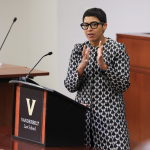Reproductive rights scholar Melissa Murray warned that the Supreme Court’s decision in Dobbs v. Jackson Women’s Health has set the stage for the establishment of fetal personhood rights under the Fourteenth Amendment and the elimination of abortion rights in her lecture in Flynn Auditorium last month.
 Murray is the Frederick I. and Grace Stokes Professor of Law at New York University. She delivered the 2023 Florrie Wilkes Sanders Lecture as part of the Dean’s Lecture Series organized by the Office of Diversity, Equity, and Community.
Murray is the Frederick I. and Grace Stokes Professor of Law at New York University. She delivered the 2023 Florrie Wilkes Sanders Lecture as part of the Dean’s Lecture Series organized by the Office of Diversity, Equity, and Community.
Murray drew her lecture from her forthcoming Harvard Law Journal article, “Dobbs and Democracy,” co-authored with Katherine Shaw of Cardozo Law. Their article focuses on the implications of Justice Samuel Alito’s opinion overruling two landmark reproductive rights cases, Roe v. Wade and Planned Parenthood v. Casey, in which Alito “insisted that it was ‘time to heed the Constitution and return the issue of abortion to the people’s elected representatives.’”
“Justice Alito’s invocation had undeniable rhetorical power,” Murray said. “It enabled the Court to lay waste to 50 years of law and cast the majority as heroes” by claiming the Court’s 1973 decision in Roe had “disrupted democratic debate.”
However, she noted, the Dobbs decision also “returned the abortion question to the states at precisely the moment when other Court decisions have enabled states to gerrymander districts,” which has effectively eliminated the democratic representation available in some states to large numbers of voters who favor reproductive rights.
“It’s not a coincidence that the Court returned the issue of abortion to the political process in the name of democracy at the very moment it is making our democracy less democratic,” she said.
Murray cited Wisconsin, where the state government is currently attempting to impeach an elected Supreme Court justice who has yet to decide a case, and Houston, where the Texas state government has taken control of the city’s public school district, as examples of state governments openly flouting democracy through the actions of their gerrymandered legislatures.
“Partisan gerrymandering not only results in more extreme laws that severely restrict abortion and contraception, it also makes it harder for people to vote out the politicians who enact these measures and take these actions,” Murray emphasized.
She also cited Justice Clarence Thomas’s concurrence in Dobbs as hinting broadly that he favors a ruling “that would acknowledge the personhood of the fetus and the unconstitutionality of all abortions.”
Concluding that the Dobb’s majority claim “that democracy demanded overruling Roe and Casey was deployed to overcome the force of stare decisis in Dobbs,” Murray stated that “the appeal to democracy has jurisprudential implications beyond overruling Roe.”
S he predicts future cases, including cases addressing the LGBTQ civil rights granted under the Obergefell decision, in which the Court’s majority will “see for itself a question the constitution leaves to the people,” while failing to address gerrymandered state governments when such action is now essential to ensuring a truly democratic outcome.
he predicts future cases, including cases addressing the LGBTQ civil rights granted under the Obergefell decision, in which the Court’s majority will “see for itself a question the constitution leaves to the people,” while failing to address gerrymandered state governments when such action is now essential to ensuring a truly democratic outcome.
“We know that as a result of gerrymandering, state legislatures are often the least representative,” she said, noting that many state legislatures include few women and that districts are often drawn to limit representation of minority groups.
“The Dobbs court conspicuously makes no mention of direct democracy, although a number of states have voter initiatives and referenda to protect abortion rights,” she said.
Murray is the Faculty Director of the Birnbaum Women’s Leadership Center at NYU and a leading public intellectual with extensive impact on current debates. She is co-host of the popular podcast Strict Scrutiny. She was a Jefferson Scholar and an Echols Scholar at the University of Virginia. After earning her J.D. at Yale Law School, she clerked for then Judge Sonia Sotomayor of the Second Circuit Court of Appeals and for District Court Judge Stefan Underhill of the District of Connecticut.
The Florrie Wilkes Sanders Lectureship was established by the family of Sylvia Sanders Kelley (BA’54) to honor her great-grandfather, Judge John Summerfield Wilkes, and her grandmother, Florrie Wilkes Sanders, who graduated from Vanderbilt University in 1925. Past lecturers have included Justice Cornelia (Connie) Clark ’79 (BA’71) of the Tennessee Supreme Court, Katherine M. Franke, Isidor and Seville Sulzbacher Professor of Law at Columbia University, Vicki Schultz, Ford Foundation Professor of Law and Social Sciences at Yale Law School, and Deborah L. Rhode, Ernest W. McFarland Professor of Law at Stanford Law School.